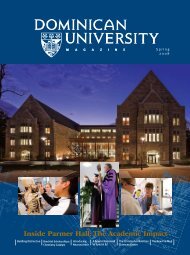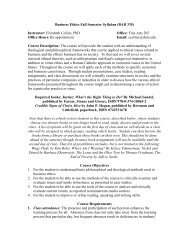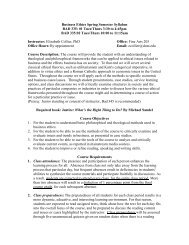6 2 - Dominican University
6 2 - Dominican University
6 2 - Dominican University
You also want an ePaper? Increase the reach of your titles
YUMPU automatically turns print PDFs into web optimized ePapers that Google loves.
While the experience officially<br />
begins in the classroom with<br />
assigned readings and lectures,<br />
the real learning takes place<br />
during the five-day excursion<br />
down historic Highway 61 from<br />
Memphis to the Mississippi<br />
Delta. From the moment the<br />
dozen or so students exit the<br />
Memphis airport, they are<br />
immersed in a carefully scripted<br />
journey weaving culture, history,<br />
legend and mystery into an<br />
unforgettable educational<br />
adventure entitled “Down at the<br />
Crossroads: The Musical and<br />
Racial Heritage of Memphis and<br />
the Mississippi Delta.”<br />
During the five-day excursion, Professor Monti and<br />
her students visit “Sunshine” Sonny Payne who hosts<br />
the blues radio program King Biscuit Time on KFFA<br />
radio in Helena, Arkansas.<br />
Since 2004, Janice Monti, PhD,<br />
professor of sociology and<br />
department chair of sociology<br />
and criminology, has led the<br />
course, which integrates themes<br />
of race, civil rights and the<br />
musical legacy of the South. It’s<br />
education steeped in experience.<br />
“Most students are crazy about<br />
music, yet most are unfamiliar<br />
with the African-American<br />
heritage that is the backbone of<br />
American popular music,” she says.<br />
The first stop on the trip is the<br />
National Civil Rights Museum<br />
located at the Lorraine Motel in<br />
Memphis where Martin Luther<br />
King Jr. was assassinated. “It’s one<br />
of the most wonderful museums<br />
and it sets the tone for the<br />
rest of the trip,” Monti says.<br />
“Experience is one of the best<br />
ways for students to get the<br />
concepts and information<br />
presented in the classroom.<br />
While they have heard about<br />
Martin Luther King Jr. and the<br />
civil rights movement, in order<br />
to fully understand race and civil<br />
rights in our country you need<br />
to connect to the musical<br />
heritage of the South. When you<br />
look at the history of blues and<br />
gospel music you are talking<br />
about the very themes that<br />
underscore the racial legacy of<br />
the United States.”<br />
Following the<br />
National<br />
Civil Rights<br />
Museum is an<br />
orchestrated<br />
sequence of<br />
visits to the<br />
Stax Museum<br />
of American<br />
Soul Music<br />
and the<br />
Soulsville<br />
neighborhood<br />
of Memphis;<br />
and a<br />
journey down<br />
Highway 61 to the Mississippi<br />
Delta, using the life and times of<br />
historic blues musician Robert<br />
Johnson – whose life and<br />
untimely death were shrouded<br />
in mystery – as a metaphor for<br />
the experience. A certified<br />
ethnographer leads the trip<br />
alongside Professor Monti.<br />
In Money, MS, the group visits<br />
the important sites linked to the<br />
birth of the civil rights movement<br />
such as the Bryant Grocery Store<br />
where Emmet Till reportedly<br />
whistled at a young girl, leading<br />
to his murder, and Tallahatchie<br />
River where his body was<br />
discovered. The students spend<br />
the night in sharecropper shacks<br />
and travel to former cotton<br />
plantations, gravesites, and the<br />
legendary crossroads where<br />
Robert Johnson allegedly sold<br />
his soul to the devil in exchange<br />
for extraordinary musical talent.<br />
For sophomore Jeremy Porter,<br />
the trip was especially profound<br />
since his family roots extend to<br />
Memphis and Clarksdale, MS.<br />
“My grandfather worked in the<br />
cotton fields of Clarksdale, and<br />
staying in the shacks was very<br />
emotional because I thought<br />
possibly my family could have<br />
lived in those same shacks,”<br />
Porter recalls. “It was hard<br />
because it wasn’t a livable<br />
place in my eyes.”<br />
“The historical and racial<br />
memory for the students is quite<br />
profound,” Monti says. “While<br />
they know vaguely about that<br />
history, what they hadn’t<br />
realized is that the Delta<br />
counties of Mississippi rank the<br />
lowest in health, education and<br />
quality of life issues, and are<br />
among the poorest in the United<br />
States. At this point of the<br />
course, we confront that legacy<br />
and the reasons why it is still the<br />
case today. In total, it is a<br />
revelation to the students<br />
because we don’t visit the typical<br />
tourist destinations.”<br />
“Seeing the way people live was<br />
amazing,” says Cecilia Tobias<br />
’10. “It is America’s third-world<br />
country and it’s right below our<br />
feet. I had never been down south<br />
before and having the ability to<br />
immerse yourself in an area you’re<br />
not familiar with was important<br />
because now I have an idea of<br />
what people are living through.”<br />
“I believe we may be the only<br />
school to offer a course such as<br />
this for credit,” Monti concludes.<br />
“There are many profound<br />
unintended consequences for<br />
students because it really<br />
expands their view of the world.<br />
It is quite powerful.”<br />
FEATURE<br />
BLUES AND THE SPIRIT II<br />
SYMPOSIUM<br />
A sold-out crowd of music and<br />
history scholars and fans<br />
attended the Blues and the<br />
Spirit II Symposium on Chicago<br />
Blues and Gospel Music, June<br />
9-10 on the <strong>Dominican</strong><br />
campus. The event,<br />
commemorating the<br />
centennial of Howlin’ Wolf’s<br />
birth, as well as the 40th<br />
anniversary of Living Blues<br />
magazine, included keynote<br />
addresses by Chuck D,<br />
co-founder of seminal rap<br />
group Public Enemy and one<br />
of Rolling Stone magazine’s<br />
“50 Most Important Performers<br />
in Rock & Roll History”; award<br />
presentations to Barry Dolins,<br />
deputy director of the Mayor’s<br />
Office of Special Events and<br />
the catalyst for Chicago’s blues<br />
and gospel festivals, and<br />
Howlin’ Wolf’s daughters,<br />
Bettye Kelly and Barbra Marks;<br />
and a thrilling pro jam<br />
featuring the surviving<br />
sidemen of legendary blues<br />
musicians Muddy Waters,<br />
Willie Dixon and Howlin’ Wolf,<br />
and renowned musicians from<br />
the current Chicago blues<br />
scene. The symposium<br />
concluded with a pro jam with<br />
some of the original Howlin’<br />
Wolf sidemen and an afterparty<br />
at Rosa’s Lounge.








